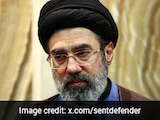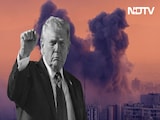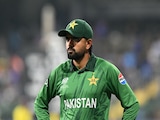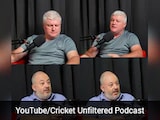- NATO members agreed to boost defence spending to 5% of GDP at the summit in The Hague
- US President Trump believes Vladimir Putin wants to end the war in Ukraine quickly despite losses
- NATO Secretary General Mark Rutte warned Russia could attack an alliance country within three years
For US President Donald Trump, Vladimir Putin is a man looking for an off-ramp to his bloody three-year assault on Ukraine.
But according to NATO Secretary General Mark Rutte, the Russian leader may be just getting started. If the alliance does not invest in its defense capabilities, Rutte warned the annual NATO summit on Tuesday, Russia could attack an alliance country within three years.
By most measures, this year's NATO summit in The Hague was a success.
Member states largely agreed to a US demand to boost defense spending to 5% of gross domestic product. Trump, who once derided the alliance as a "rip-off," said his view had changed, while a budding bromance blossomed between him and Rutte, who compared the US president to a stern "daddy" managing his geopolitical underlings.
But the summit, which ended on Wednesday, also highlighted the widening gap between how the US and Europe see the military ambitions of Russia, the bloc's main foil.
That is despite some lawmakers in Trump's own Republican Party hardening their rhetoric in recent weeks, arguing that while the president's ambition to negotiate an end to Russia's war in Ukraine is laudable, it is now clear that Putin is not serious about coming to the table.
In a Wednesday press conference, Trump conceded that it was "possible" Putin had territorial ambitions beyond Ukraine. But he insisted that the Russian leader - buffeted by manpower and materiel losses - wanted the war to end quickly.
"I know one thing: He'd like to settle," Trump said. "He'd like to get out of this thing. It's a mess for him."
Secretary of State Marco Rubio echoed Trump's view in a sideline interview with Politico, saying the US was holding off on expanding its sanctions against Moscow, in part to keep talks going.
"If we did what everybody here wants us to do - and that is come in and crush them with more sanctions - we probably lose our ability to talk to them about the ceasefire," he said.
The message from others at the summit was starkly different.
A senior NATO official told reporters in a Tuesday briefing that Putin was not in fact interested in a ceasefire - or in engaging in good-faith talks at all.
"Regardless of battlefield dynamics, we continue to doubt that Russia has any interest in meaningful negotiations," the official said.
Russia's ambitions, the senior official said, go beyond control of "certain territories at their administrative lines," as Rubio put it. Putin is instead bent on imposing his "political will" on neighboring states.
Rutte put the Russian threat in existential terms.
"If we do not invest now," he said on Tuesday, "we are really at risk that the Russians might try something against NATO territory in three, five or seven years."
Russia strategy remains elusive
The US is not the only NATO member with a more optimistic view of Russia.
Speaking to reporters on Wednesday, Hungarian Prime Minister Viktor Orban, a longtime Trump ally and critic of European institutions, said Russia was "not strong enough to represent a real threat to NATO."
Still, as the alliance's largest contributor and most powerful member, Washington's position is a central preoccupation in most NATO capitals.
The White House, asked for comment, referred to Trump's comments at the Wednesday press conference.
In response to a request for comment, a separate NATO official, also speaking on condition of anonymity, disputed that there were differing assessments within the alliance, pointing to a NATO declaration on Wednesday which referenced the "long-term threat posed by Russia."
The Russian embassy in Washington referred to Thursday comments by Foreign Ministry spokeswoman Maria Zakharova, who criticized NATO for wasting money on defense.
"It seems that only by invoking the fabricated 'Russian threat' will it be possible to explain to ordinary people why their pockets are being emptied once again," she said.
The US State Department and the Ukrainian embassy in Washington did not respond to requests for comment.
The lack of a common understanding about Putin's goals will complicate future diplomatic plans to wind down the war, said Philippe Dickinson, the deputy director of the Transatlantic Security Initiative at the Atlantic Council and a former British diplomat.
"To reach a peace agreement, it's not just something that Trump and Putin can agree themselves," Dickinson said.
"There does need to be European involvement. That needs to mean that there is some sort of sharing of views among allies on what Putin is trying to achieve."
European leaders likely have not given up on trying to change Trump's views on Russia, Dickinson said.
But they were always unlikely bring up thorny conversations at the NATO summit. The alliance's main goal was to simply get through it without major blowups, he said, an aim that was accomplished.
Still, peace came at a cost - the lack of substantive discussion around Ukraine and Russia, he argued, was conspicuous.
"The lack of a Russia strategy is a real glaring omission from what the summit could have produced," Dickinson said.
(Except for the headline, this story has not been edited by NDTV staff and is published from a syndicated feed.)















